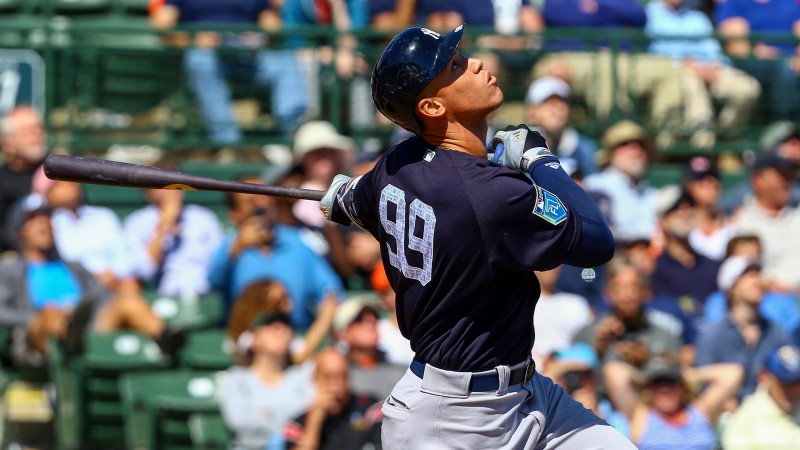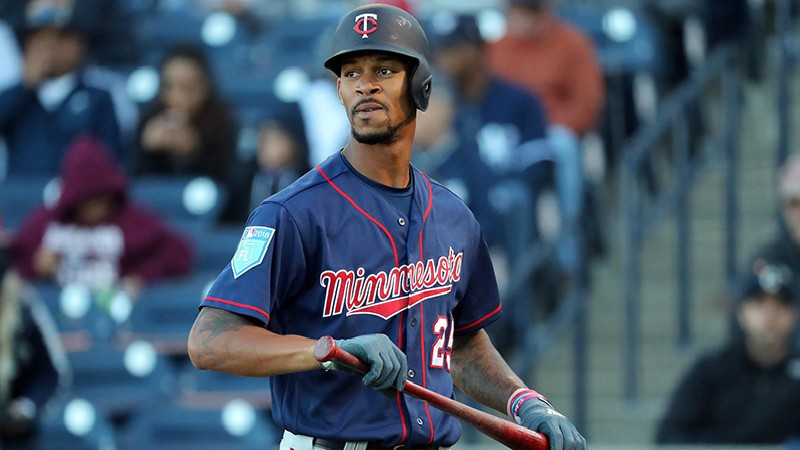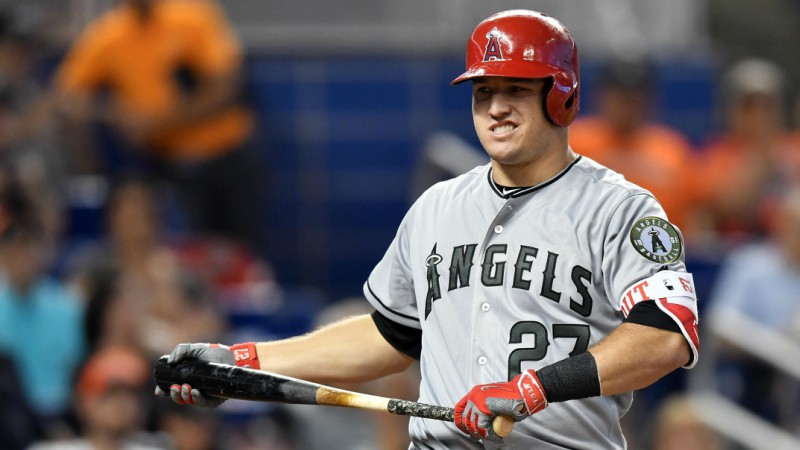Baseball Is the Best: Fail Often, Win Big
Photo credit: Butch Dill-USA TODAY Sports
Sign up for The Action Network’s daily newsletter to have the best sports betting insight and analysis delivered to your inbox.
This is the 177th installment of The Labyrinthian, a series dedicated to exploring random fields of knowledge to give you unordinary theoretical, philosophical, strategic and/or often rambling guidance on daily fantasy sports and/or sports betting. Consult the introductory piece to the series for further explanation.
The Northeast is covered in snow and looks like it was just conquered by the Night King, but the calendar says it's spring, so baseball's about a week away. Put away the Valyrian steel, and break out the ash, maple and hickory: It's time to swing some wood . . . in a totally literal and non-sexual way . . . but the sexual way works, too. Whatever.
I have a lot of interests. Shakespeare. Football. Woody Allen movies.Refereeing weird prop bets. Breathing oxygen. Pretending to work out. Being 'Merican. For someone who has no work-life boundaries — as I type this sentence I'm ostensibly on 'vacation' (cough) spending time with 'family' (cough, cough) — I'm an incredibly balanced guy.
Of all my interests, baseball is perhaps the one I love the most. (Not really, but that's the story I'm sticking with for this piece.) I love sports in general, and baseball is different from any other professional sport.
Here are the two primary differentiators that to me make baseball the great American pastime. As it turns out, these have implications for how speculators should approach the sport for the purposes of daily fantasy and betting.
1. Baseball Is Collaborative, Not Competitive
In basketball, if Steph Curry takes a shot then that's one less opportunity for Kevin Durant. In football, if Ezekiel Elliott gets a carry then that means Dez Bryant doesn't get a target. In hockey, if . . . I don't know enough about hockey to name two guys on the same team, but you get the idea. In three of the four major sports, teammates aren't just competing against the other team. They are also competing with each other for opportunities to accumulate personal statistics.
In a philosophical sense, basketball, football and hockey players don't really compete against opposing teams. They compete against time — the game clock. And because each contest has a limited time frame (plus the possibility of overtime), teammates ultimately compete with each other.
In baseball, though, there is no game clock. Like most of life's best pleasures, it's untimed.
About 10 years ago when my wife and I lived in Boston, we went to a game at Fenway Park. There was a risk of rain, so we were able to buy tickets on the cheap, which was awesome. What wasn’t so awesome was the hour-long rain delay before the game even started — and the hour-and-a-half rain delay in the middle of the game — and the three extra innings. Seriously, we were at Fenway for at least six hours. Maybe seven.
Rain delays and extra innings don’t occur at every baseball game, but in an extreme way, they highlight the larger point: In real time and game time, baseball is untimed. This fact is significant, because it means that as long as MLB batters and baserunners don't get out — as long as they don't fail — a game can be prolonged indefinitely.
Try as they may, NFL, NBA and NHL players and coaches cannot stop the clock. At most, they can control the ball or puck for a longer period of time and operate at a faster pace in order to maximize the clock — but in the end, regardless of what they do, they cannot stop the clock from winding down to zero.
Not even perfection in these three sports can delay the inevitable. If an NFL team scores a touchdown on each possession, the game will still end. If an NBA team manages not to miss a single shot, the game will still end. If an NHL team makes 100 percent of the shots it takes, the game will still end. In the big picture, the success (or lack of success) a team has will have a relatively small impact on the clock. Regardless of what an NFL, NBA or NHL team does, the clock will run out in roughly the way it would have if different events had unfolded in the game.
In other words, the professional athletes in the NFL, NBA and NHL — and even those in the PGA and NASCAR — have capped DFS upside. They live in galaxies that are known.
But MLB players — especially batters — live in a limitless universe. They have theoretically uncapped DFS upside. If an MLB team turns every batter into a baserunner and successfully scores every baserunner, the game will never end. If a team creates and scores baserunners at even 'just' 50% efficiency, a game will last a long time, that team will score a lot of runs and many of the teammates will have outsized fantasy production.
Because baseball is untimed, it benefits from a wonderful compounding effect. It operates via a law of plenitude instead of scarcity. The logic of the network prevails, and correlation is king. In baseball, what's good for one player is good for all his teammates in a clear and linear way. The same is not true for players in basketball, football and hockey.
Of course there's a distinction between what’s theoretical and what’s actual — but across 30 teams and 162 games per team per season, the theoretical has a way of occasionally becoming the actual. If it’s theoretically possible for teams to accrue ‘unbelievable’ run totals in any given game, across a large enough sample of games there’s a reasonable chance that it will actually happen. Over a long enough period of time, a No. 16 seed will beat a No. 1 seed, right?
Because baseball is untimed, MLB teams and players have theoretically unlimited upside, whereas NFL, NBA, and NHL teams and players do not. What this means is that DFS players should leverage our Lineups page and use our Models to create rosters that are strategically stacked with teammates. That's really the only way to play MLB DFS.
As a person, I like the idea of a compounding endeavor that even within a confrontational framework is less about competition and more about collaboration. The world is made better when people with a common goal work with each other instead of alongside or against each other. At least that's what baseball taught me when I was a kid.
2. Baseball Is About Failure
Like life, baseball is all about failure — or, more precisely, about how to deal with inevitable and repeated failure on the way to victory.
Think about what the primary task is in baseball, and then compare that to the primary tasks of other sports. In baseball, one guy stands 60 feet, six inches away from another guy. He then throws a small ball as hard as he can near the other guy, who swings a weighted wooden stick in the hopes of hitting the ball hard and far. For the guy hoping to hit the ball, that’s not an easy task. That’s probably the hardest task in team sports.
In the NFL, the primary task is to catch the ball or take a handoff and carry the ball to another part of the field. Fundamentally, there’s nothing difficult about catching a football, taking a handoff or running with the football in your hands. In the NBA, the primary task is to put the ball through the hoop. This can be done in a variety ways — dunk, jump shot, hook shot, granny shot — and some shots are incredibly difficult, but in general as a physical act, shooting a basketball is easier than hitting a baseball. In the NHL, the primary task is to shoot a puck into a fairly large goal. There’s usually a person with a lot of padding standing in front of the goal, but the simple act of swinging a stick and hitting a stationary or gently gliding puck isn’t tremendously difficult.
But hitting a baseball is hard, and batters frequently fail. They fail much more than they succeed. For them, failure is the norm. Being a good MLB hitter is less about being better than the other hitters in the league and more about not being as bad as they are.
Baseball is not about perfection. It's about production in the face of incessant failure.
Success and failure are relative. For one, success for MLB hitters isn’t even necessarily about getting a hit. It’s about not failing. It’s about not making an out. In the NFL, NBA and NHL, success is usually defined through the language of positivity: A wide receiver caught the ball, a shooting guard hit a jump shot and a winger scored a goal. In MLB, however, the purest definition of success for a batter can be stated as the negation of the unfavorable outcome: He didn’t cause an out. He didn’t get out, and no one else got out as a result of his at-bat.
Hits and home runs are nice — they help teams win games — but they are a means, not an end. The ultimate goal of any at-bat is not to cause someone to get out (aside from the occasional sacrifice bunt or fly ball). The end for batters is to finish at-bats with the same number of outs on the scoreboard as there were when they stepped into the batter’s box.
Given all of this, it’s not a surprise that (in the aggregate) MLB hitters fail far more than they succeed. In fact, whereas NFL, NBA and NHL contests are driven forward by units of time, MLB contests are driven by units of failure. In baseball, failure is actually a measurement of progress within the game. Failure is structural and inherent in the rules of the game itself. It’s something that’s obvious to everyone — it’s one of the first concepts of the game that children learn when they are introduced to baseball — but people don’t fully appreciate it: The game of baseball is advanced, literally, through failure. If a team’s batters or runners do not fail to advance at least 24 (and often 27) times in a game, then that team cannot win. In order ultimately to be victorious, a team's individual players must fail many times per game.
Just sit for a second and appreciate how backward that truly sounds. A team must fail a lot (per the official rules of the sport) in order to win. Imagine a boxer being told that the rules require him to take 100 punches to the face before he can be declared the winner in a fight. Imagine a golfer needing to hit three bogeys per round in order to be eligible to win a tournament. Imagine a team of bowlers being unable to beat its opponent unless its members roll 24-27 gutter balls between them. All of that sounds ridiculous. But in baseball it's the norm. For a team to win, it must endure significant and repeated failure.
That an MLB team cannot get through an inning, much less a game, without needing to fail is both ludicrous and amazing. It’s no wonder that baseball became this country's national hobby more than 100 years ago. Regardless of your politics, beliefs, country of origin, etc., we can all see that there’s something distinctly American about a sport that demands that people deal with failure on the way to success. In that way, MLB has a mental grittiness to it that the NFL, NBA and NHL lack even though those sports are much more physically exhausting.
Essentially what matters in baseball — and almost every important life matter — is not the frequency with which someone fails but the magnitude with which he succeeds when he manages not to fail. (In other words, positive expected value.) Given that, I think it's appropriate that the most profitable MLB betting systems at Bet Labs — at least those of which I'm aware — tend to have win rates well below 50%. As Josh Applebaum points out in his 2017 MLB recap, baseball is a moneyline sport, and it's usually better to back underdogs, which means that you don’t need to win the majority of your wagers to be profitable.
No one likes losing on a regular basis, and over the course of a season, it's mentally challenging for even profitable sports bettors to stay focused and reasoned when they lose more often than they win.
But this is baseball.
Hall-of-Fame hitters strike out way more than they hit home runs. Why shouldn't that be the case for people who bet on the game?
"APRIL Is the Cruellest Month"
That's how T.S. Eliot's Waste Land begins — with the ALL-CAPPING of "April," intentional misspelling of "cruelest" and disparaging of one of the best months of the year. Whatever. Eliot was weird.
In April we have the Masters, NBA playoffs, NHL playoffs, a NASCAR race at Talladega Superspeedway, the NFL draft — and of course the first month of baseball. And Easter. You don't even need to be Christian to enjoy eating chocolate eggs and bunnies.
I'm looking out the window as I type this sentence. (That's right — I don't need to look at the keyboard when I type: #Awesome.)
Outside the snow is melting. The goddess of spring has awakened. Baseball is almost here.
It's time to band together, fail often and win big.
——
The Labyrinthian: 2018.01, 177
Matthew Freedman is the Editor-in-Chief of FantasyLabs. He has a dog and sometimes a British accent. In Cedar Rapids, Iowa, he’s known only as The Labyrinthian. Previous installments of the series can be accessed via the series archive.
Pictured above: Aaron Judge
Photo credit: Butch Dill-USA TODAY Sports
How would you rate this article?






